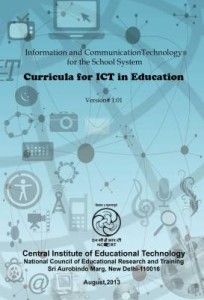The objectives of NCERT’s curricula for ICTs is “For the teacher, it is an initiation into exploring educational possibilities of technology, learning to make the right choices of hardware, software and ICT interactions, and more importantly, growing to become a critical user of ICT. For the student, it is an initiation into creativity, problem solving, and an introduction to the world of information and technologies which could also shape career pursuits.” The curriculum is in three parts – Basic, Intermediate and Advanced which covers the basic usage to software application and programming languages to some extent. The emphasis of the curricula for both teachers and students seems to be on use of the technologies and tools in education. On the other hand, developing ‘computational thinking and coding’ is the goal for K-12 curriculum as stated by Computer Science Teachers Association and ACM in the US and developing ‘creators of technology rather than consumers of technology’ is the ambition of The Royal Society of UK.
The NCERT Curricula for ICT in Education also clearly says that “It should not be used at the primary stage (classes 1 to 5). A structured ICT programme at the primary stage is not desirable and can be counter productive”. Whereas the ‘Model Computer Science Curriculum for?Schools’ released by IIT, Bombay recommends syllabus from Class I onwards and suggests using SCRATCH programming (developed by MIT especially for elementary / primary schools students) and further emphasizes the need for developing ‘computational thinking’. The IIT, Bombay document goes on to say that children are surrounded by computers and internet in variety of ways and if they are not taught how to use them; they may pick up undesirable habits and incorrect usage and hence it was desirable for schools to introduce use of computers in the curriculum itself, even from Class I onwards.
On the positive side, NCERT recommends “Use of proprietary software would become very expensive and make the implementation unviable. Therefore, Free and Open Source software have been suggested throughout the curricula”. On the whole, NCERT curriculum seems to have been designed for the teachers and students who lack access to computers and who risk getting left behind in the ‘digital information age’ and can ensure more inclusive use of ICTs in education. From that point of view, NCERT curricula is a great addition to the CBSE syllabus and fulfills NCERT’s mandate by introducing ICT curricula for students and as well as for teachers.
The stated goals of Royal Society in UK or the ACM and CSTA in USA for introducing computer science in K-12 curriculum would lead to a conclusion that the high school students in those countries will develop ‘computational thinking’ and will develop ‘programming or coding skills’ as part of their school education. I would have liked to see similar goals articulated in NCERT Curricula for ICT in Education to synergize with the National goals to be a software and IT superpower.
Indians have made a name for themselves in software and IT but we should not be complacent and think that Indians are naturally endowed with these skills or wait till students enter college to acquire these skills in engineering or BCA courses. We have to decide whether we would be content with managing call centres, BPOs and ITES activities or we want move ahead in the value chain by being ‘creators of technology’ and ‘software products’ for the global market. To achieve this objective, the Computer Science curriculum in Indian schools should be benchmarked with the CS curriculum in developed countries which has been dealt with to an extent in IIT, Bombay’s Model CS curriculum. The overall curriculum goals and content can be reviewed and if required modified to accommodate CS curriculum to the extent needed in K-12 to achieve the desired learning outcomes.
Parents and Schools can take the initiative to develop computational thinking in childrenby using free online resources like Scratch from MIT, Alice Programming from Carnegie Mellon, Java Script, Python and Ruby Programming from Code Academy or online CS courses from www.mypalonline.com or www.eimacs.com designed especially for talented high school students. MyPal Online School believes that Kids can be self motivated and need the right type of facilitation from Parents and Teachers or their involvement as co-learners for an early start in Computer Science / Coding.

References:
- Curricula for ICT in Education, Ver 1.01, NCERT, August, 2013
- Computational Thinking in K−12: A Review of the State of the Field , Shuchi Grover and Roy Pea?EDUCATIONAL RESEARCHER 2013 42: 38?.
- Shut Down or Restart :The way forward for computing in UK schools, Royal Society report on CS education in UK, Jan 2012.
- Model Computer Science Curriculum for Schools, Sridhar Iyer, Malathy Baru, Vijayalakshmi Chitta, Farida Khan, and Usha Vishwanathan, ?Department of Computer Science and Engineering, ?Indian Institute of Technology Bombay,March, 2010
- Reading, Writing, Algorithms: Should IT Classes Be Required?Hilmar Schmundt , Spiegel Online International, May 16, 2013
- Wing, J. (2006). Computational thinking, Communications of the ACM, 49(3), 33–36.


